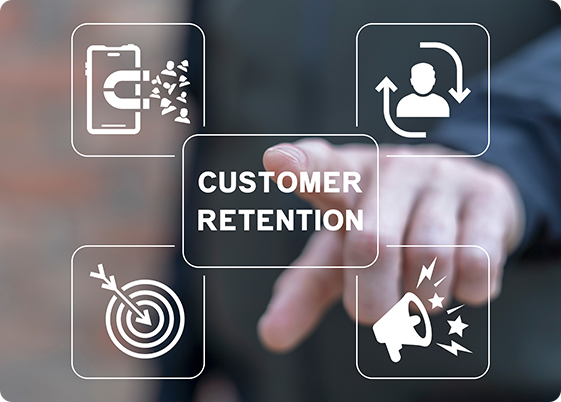
At the heart of every successful business is one core principle – customer satisfaction. More than a fleeting measure of contentment, customer satisfaction encompasses the entirety of a consumer's journey with a product or service. It explores the emotional resonance, perceived value, and alignment of expectations with experiences.
Customer satisfaction is the compass guiding businesses through the intricacies of consumer preferences, fostering not only loyalty but also a positive ripple effect that influences brand perception. Active listening, swift responses, empathy, and consistent service are essential in customer interactions.
This blog will delve into the importance of customer satisfaction in business, exploring what it entails, why it is crucial to a company, and how to achieve it in today’s competitive landscape.
What Is Customer Satisfaction?
In today’s competitive business landscape, where customers have endless choices, the phrase “the customer is king” holds more weight than ever. Customer satisfaction goes far beyond a single purchase—it reflects how customers feel about their entire journey with a brand.
Here’s a breakdown of what it really means:
- Definition:Customer satisfaction measures how content and pleased customers are with a product, service, or overall brand experience.
- Beyond Transactions:It doesn’t stop at the point of purchase; it includes pre-purchase research, the buying process, and after-sales support.
- Emotional Connection:True satisfaction arises when businesses not only meet but exceed expectations, creating a sense of trust, value, and recognition.
- Indicator of Success:High levels of satisfaction signal that a company is delivering on its promises and building meaningful relationships.
- Business Impact:Customer satisfaction is important for a business, and cannot be overstated—it drives loyalty, repeat sales, referrals, and positive brand reputation.
- Long-Term Value: A satisfied customer is not just a one-time buyer but a potential brand ambassador who recommends the business to others.

Why is Customer Satisfaction Important?
The success of any business hinges on its ability not only to attract customers but also to keep them satisfied. Customer satisfaction goes beyond a mere transactional smile; it is the secret sauce of sustained success. To answer the question of “what is customer satisfaction?”, it’s the emotional and practical fulfilment customers feel after engaging with your brand.
The benefits of customer satisfaction extend beyond loyalty; they fuel referrals, reduce churn, and enhance brand perception. While the customer satisfaction definition may seem simple, determining what "happy customers" truly mean for your company is not as easy as it sounds.
Here are key reasons why client satisfaction matters:
Driving Customer Loyalty
One of the paramount reasons why customer satisfaction holds immense significance is its direct correlation to customer loyalty. Satisfied customers are more likely to remain committed to a brand, becoming repeat buyers and brand advocates.
Loyal customers not only contribute to a steady revenue stream but also act as ambassadors, influencing others to choose the same brand. The connection between customer satisfaction and loyalty is a virtuous cycle that businesses strive to establish and maintain.

Measuring Support Team's Performance
The level of customer satisfaction serves as a barometer for the effectiveness of a company's customer support team. By analysing customer feedback and satisfaction metrics, businesses can gauge how well their support teams are addressing customer needs.
Measuring customer satisfaction provides valuable insights into areas that may need improvement, helping companies refine their support processes and enhance overall customer experience.
Encouraging Repeat Customers
Repeat business is the lifeblood of sustained success. When customers are satisfied with their initial interactions, they are more likely to return for future purchases. This not only contributes to revenue growth but also reduces the cost of customer acquisition.
Happy customers require less convincing to make subsequent purchases, fostering a sense of trust and reliability that is invaluable in a competitive market.
Boosting New Customer Acquisition
Word of mouth is a powerful driver of business, and satisfied customers play a pivotal role in this. Happy customers are more likely to recommend a brand to their friends, family, and social networks. Positive reviews and recommendations act as powerful endorsements, significantly influencing potential customers in their decision-making process.
In this way, customer satisfaction becomes a catalyst for new customer acquisition, creating a ripple effect that extends the business's reach.
How Customer Satisfaction Fuels Business Growth
Customer satisfaction is not just about keeping customers happy—it directly contributes to long-term business growth. When customers feel valued and their needs are consistently met, they are more likely to remain loyal to the brand, spend more over time, and recommend it to others. This ripple effect enhances profitability, reduces churn, and strengthens the brand’s position in the market.
Let’s explore how customer satisfaction affects business performance and fuels sustainable growth.

Increased Customer Retention
Satisfied customers are more loyal and less likely to switch to competitors. Retention is more cost-effective than acquisition, and keeping customers happy ensures a stable revenue base.
Higher Customer Lifetime Value
When customers are consistently satisfied, they are likely to make repeated purchases, upgrade to premium products, and engage with other services, thereby increasing their lifetime value to the company.
Positive Word-of-Mouth & Referrals
Satisfied customers often become enthusiastic advocates—writing positive reviews, recommending the brand to peers and driving organic referrals that lower acquisition costs.
Competitive Advantage
Exceptional customer satisfaction creates a clear competitive advantage — when experience is superior, customers choose you over alternatives even when prices are similar.

Reduced Marketing Costs
Strong customer satisfaction lowers the dependency on heavy advertising spend. Retained customers and organic referrals help reduce customer acquisition costs, making growth more cost-efficient.
Measuring Customer Satisfaction: Metrics That Matter
Tracking the right customer satisfaction metrics helps businesses understand sentiment and identify areas for improvement. To truly understand the importance of customer satisfaction, businesses must track the right metrics. These measurements provide actionable insights into customer sentiment and help organisations improve performance.
CSAT (Customer Satisfaction Score)
A short survey asking customers to rate their satisfaction with a product or service on a scale (e.g., 1–5). CSAT is easy to measure and gives instant feedback on customer sentiment.
NPS (Net Promoter Score)
NPS measures how likely customers are to recommend your brand to others. By categorising respondents into promoters, passives, and detractors, businesses gain a clear picture of customer loyalty.
CES (Customer Effort Score)
CES evaluates how easy it is for customers to interact with your company, whether it’s finding information, making a purchase, or resolving issues. Lower effort usually leads to higher satisfaction.
Churn Rate
Churn rate tracks the percentage of customers who stop doing business with you over a given period. Monitoring churn helps companies to identify dissatisfaction early and take corrective action.
How to Achieve Customer Satisfaction?
Achieving and measuring customer satisfaction is not just a goal; it's a fundamental pursuit that underpins the success of any enterprise. Understanding the art of creating delighted customers involves a multifaceted approach, blending proactive strategies with a genuine commitment to meeting and exceeding customer expectations.
Businesses wondering how to improve customer satisfaction should focus on consistent service, personalisation, and feedback-driven improvements. Here are some proven tips to improve customer satisfaction and create delighted customers:
Deliver Consistently Excellent Service
Whether online, in-store, or through a call centre, consistent service builds trust. Customers value predictability and reliability in every interaction.
Personalise the Experience
Tailor recommendations, offers, and communication based on customer preferences and past interactions. Personalisation makes customers feel recognised and valued.
Make It Easy to Get Help
Ensure that support channels—such as phone, email, chat, or social media—are easily accessible. Self-service options like FAQs or AI chatbots can reduce effort for routine queries.
Act on Feedback
Collect feedback through surveys, reviews, and direct conversations. More importantly, act on it. When customers see improvements based on their input, it builds trust and loyalty.
Focus on Product Quality
Even the best service cannot compensate for poor product quality. Consistently delivering high-quality products that meet customer expectations is essential for long-term satisfaction.
Top Mistakes That Can Damage Your Customer Experience
Even businesses with the best intentions can fall into traps that harm customer satisfaction. Recognising these mistakes is the first step toward avoiding them. Avoiding common customer satisfaction mistakes ensures a smoother, more positive experience for every client.
Slow Response Times
In today’s fast-paced world, customers expect quick resolutions. Delays in responding to queries or complaints can lead to frustration and diminished trust.
Inconsistent Service Across Channels
Customers often interact with brands through multiple channels. If the quality of service differs across platforms (e.g., smooth online support but poor in-store help), it creates confusion and dissatisfaction.
Ignoring Customer Feedback
Failing to acknowledge or act on feedback signals that the company does not value customer input. Over time, this erodes loyalty and may drive customers to competitors who listen more attentively.
Conclusion
At HGS Jamaica, our commitment to customer satisfaction is at the core of everything we do. As a leading service provider, we take pride in delivering exceptional experiences that exceed expectations – we strive to surpass them.
Our team in Jamaica is dedicated to understanding the unique needs and preferences of our customers. We believe that satisfied customers are the bedrock of our success, and we work tirelessly to ensure that every interaction leaves a positive and lasting impression.
Additionally, we align with key call centre KPIs to continually enhance our service delivery. We're not just providing services; we're building relationships that stand the test of time.
In a world where businesses vie for attention and loyalty, those that place customer satisfaction at the forefront will not only weather challenges but also thrive in the long run. As customers become increasingly discerning, the importance of prioritising their satisfaction cannot be overstated.
If you’re looking to build a career in customer experience, explore opportunities in call centre jobs in Jamaica with HGS.
FAQs
How do I handle negative feedback while maintaining satisfaction?
Acknowledge it promptly, apologise if necessary, and offer a solution. Turning negative feedback into a favourable resolution often strengthens customer loyalty.
How does pricing strategy affect customer satisfaction levels?
Transparent, fair, and value-driven pricing enhances satisfaction. Hidden costs or inconsistent pricing practices can quickly lead to dissatisfaction.
What is the difference between customer satisfaction and customer experience?
Customer satisfaction is the outcome of meeting or exceeding expectations, while customer experience is the overall journey and interactions a customer has with a brand.
What psychological factors drive customer satisfaction?
Key factors include trust, perceived value, recognition, and emotional connection. Customers feel satisfied when they feel understood, respected, and valued.
 Jamaica
Jamaica Canada
Canada Colombia
Colombia India
India Philippines
Philippines UK
UK US
US SA
SA



